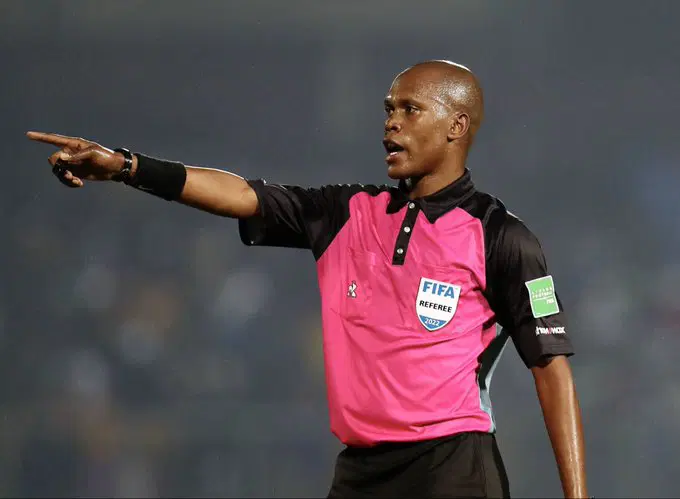Nigeria’s 4-1 victory over Gabon in the 2026 FIFA World Cup playoff delivered everything a high stakes match often promises. It produced late goals, extra time drama, and a decisive performance from the Super Eagles. Yet the most debated moment arrived much earlier in the contest when Gabon appealed for a penalty that could have changed the entire direction of the match. South African referee Abongile Tom was placed under intense scrutiny, but the way he handled the situation earned him credit from several analysts.
The incident occurred early in the second half. As Gabon lined up a free kick, Aaron Appindagoye attempted to break free from Nigerian defender Bright Osayi-Samuel inside the penalty area. Osayi-Samuel briefly tugged his shirt, creating visible contact that immediately drew protests from the Gabon players. Tom initially waved play on but was quickly called to the pitch side monitor for a VAR review. The slow motion replay made the shirt pull clearly visible, yet it also revealed that Appindagoye’s movement and balance remained largely unaffected. After reviewing the footage carefully, Tom chose not to award the penalty.
This decision became a defining moment in the match. Had Gabon taken the lead from the spot, Nigeria would have faced a much more difficult task in a tightly contested playoff. Instead, the game remained level until the 83rd minute when Akor Adams took advantage of a defensive error to put Nigeria ahead. Gabon responded immediately through Mario Lemina, forcing the match into extra time.
Once in extra time, Nigeria took full control. Chidera Ejuke restored their lead with a composed finish after an incisive pass from Wilfred Ndidi. Victor Osimhen, who had earlier missed two clear chances and faced growing criticism online, settled fully into the match and scored twice to secure a 4–1 victory and send the Super Eagles into the final round of the African playoffs.
The aftermath of the match produced contrasting opinions, particularly from Gabonese supporters who believed the penalty decision denied their team a genuine chance to influence the contest. However, a growing number of analysts and refereeing experts agreed that Abongile Tom had handled the situation with authority and composure. His decision reflected modern refereeing emphasis on the effect of a foul rather than the visibility of the contact. Although the shirt pull was clear, Tom correctly judged that it did not hinder Appindagoye’s movement or ability to challenge for the ball.
Tom was also praised for the way he used the VAR system. Rather than relying solely on the first impression from the replay, he took time to consider the context of the contact and the dynamics of the challenge. His calm manner in a hostile atmosphere, combined with a willingness to trust his own interpretation after reviewing the evidence, demonstrated strong game management. This approach prevented the match from becoming dictated by marginal decisions and ensured that the contest flowed naturally.
For Nigeria, the result will be remembered for the team’s resilience and their dominance in extra time. For Gabon, the missed penalty opportunity will linger as a painful moment in a match that briefly seemed within reach. For referee Abongile Tom, the night stands as an example of steady officiating under pressure. He maintained control, applied the laws of the game with consistency, and used VAR as a support rather than a replacement for on-field judgment.
Should we send you latest update about your favourite sports and team?
Enter you email in the box below and hit the subscribe button to join our teaming 876+ sports community.
